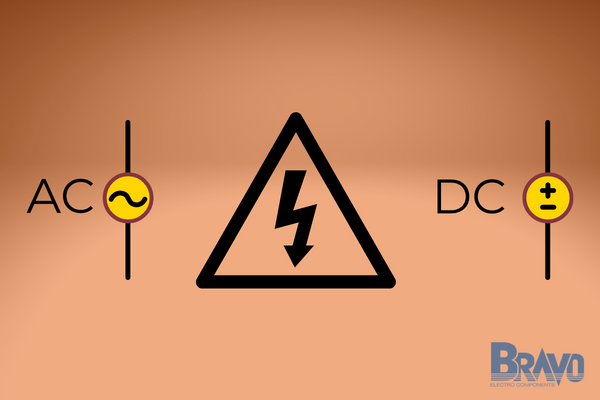
Do you know what power supply voltage is? In order to make sure you're getting the most out of your power supply, it's important to understand what voltage is and why it matters. In this blog post, we'll discuss the different power supply voltages and explain why getting the right voltage is so important.
We'll also provide some tips on how to choose the right voltage for your needs - and then, explain where you can find all your AC DC power supply needs - Bravo Electro. As the #1 choice for power supplies online, you can trust that you'll get the right equipment for your project. We source from the most reliable manufacturers the industry has to offer so you can rest assured you're getting the most bang for your buck. From 12v to 48v, we've got it all!
Before we help you choose the right unit for your needs, let's discuss what power supply voltage is in the first place.
What is Power Supply Voltage?
Power supply voltage is the amount of electrical power that is being used to operate a device or system. Voltage is measured in volts, and it is typically provided by either alternating current (AC) or direct current (DC).
The amount of power needed by any given system or device depends on the application and its design specifications. Generally speaking, the higher the voltage, the more powerful the device or system can be. This means that if you are running something that needs a lot of short bursts of energy, such as a motor, you will need a higher voltage than if you were running something that needs only a small amount of energy like an LED light.
For example, most computers use 12-volt power supplies with lower wattage ratings. This generally allows them to run smoothly with no major issues. On the other hand, larger devices such as refrigerators may require up to 48 volts and much higher wattages to run properly.
The type of power supply you choose for your device also depends on what type of application you need it for. AC power supplies are often preferred for commercial applications since they provide more flexibility in terms of voltage and frequency settings. DC power supplies are generally used for more specialized applications such as motors or solar panels since they offer more control over their outputs without having to switch between different voltages or frequencies.
It’s important to understand how much power your device requires when selecting your power supply voltage so that you don’t end up causing damage to your system due to inadequate levels of input electricity. To determine this accurately would require consulting with an electrician before purchasing a particular unit in order to ensure compatibility and optimum performance on whatever device it's powering up.
Additionally, it’s worth noting that some devices may require customized solutions beyond what standard AC/DC adaptors can provide – if this is the case then specialized industrial solutions like variable speed drives should be considered instead in order to achieve peak efficiency from your machine's operations. Or, just reach out to us at Bravo Electro - we are equipped to handle custom jobs like this with ease.
What are the Different Power Supply Voltages?
There are three common voltages you'll find on the market: 12v, 24v, and 48v. But what are the differences between these beyond the obvious - power output? Where are these different power supplies used? We'll break down each of these below in greater detail.
12 Volt DC Power supplies
The 12-volt DC power supply is the most common voltage used in most applications. It is usually found in the majority of household appliances, such as computers, microwaves, and TV sets. This voltage is also used in large-scale commercial and industrial equipment. Its low power consumption makes it ideal for both short bursts of energy or sustained use over an extended period of time.
One major benefit of the 12-volt power supply is that it can be easily adjusted to meet specific requirements and load demands. Additionally, this type of voltage has a high tolerance for temperature fluctuations, making it highly reliable and long-lasting. This makes it great for powering up more sensitive equipment like medical devices or sophisticated machinery that requires precise output control.
24 Volt DC Power Supplies
The 24-volt DC power supply is generally used in more specialized applications such as motorized processes like robotic assembly lines or factory machinery that require quicker response times from a higher torque output.
The 24-volt power supply also offers a greater range of input frequencies than its 12v counterpart making it suitable for devices that require more precise operating specifications and higher precision timing control operations.
As with any higher voltage source, caution should be taken when using this particular type as there is always a greater risk of overload due to increased current draw.
48 Volts
The 48v DC power supply is typically used for heavy-duty industrial equipment, such as mining systems or agricultural machinery that demands larger amounts of energy to operate efficiently.
This type of voltage offers excellent efficiency due to its ability to convert AC into DC electricity with less resistance than other lower voltages – thus allowing it to provide exceptional levels of sustained performance even under high loads with minimal heat dissipation.
However, due to its higher wattage requirements, this form must be handled with extreme care as any sudden changes in load demand could potentially damage your system if not properly monitored and regulated accordingly.
Other Factors to Consider on Your Power Supply Besides Voltage
When looking for a reliable and efficient power supply, voltage is certainly a key factor - however, it’s not the only one worth considering. Other factors to consider include the power output of the device you’re powering, its duty cycle, and its efficiency rating.
The power output of the device you're looking to power is an important factor to consider when choosing a power supply, as you want to ensure that your machine is able to get enough energy to operate optimally. You should also make sure that the power supply does not exceed the capacity of your device. This will allow it to function correctly.
The duty cycle of a power supply refers to how often it can be used without overheating or becoming overloaded. Generally speaking, higher-end units tend to feature longer duty cycles than lower-end ones – this is because they are better equipped at dispersing heat more efficiently while providing greater output capacities with minimal disruption.
Efficiency ratings are also an important factor when selecting a power supply, as they show how much electricity is actually being converted into usable energy compared to what’s being wasted elsewhere. Generally speaking, higher efficiency ratings equal greater cost savings over time due to reduced consumption levels – which makes them ideal for long-term use in industrial settings where operating costs are already high. It also helps keep your power supply cooler, preventing heat degradation.
Finally, be sure to read up on any safety warnings associated with each particular unit before purchasing it in order to ensure maximum safety for both yourself and anyone working within its vicinity. You can learn more about this in our guide discussing UL listed vs UL recognized power supplies. Or, check out our breakdown of class 2 vs class ii power supplies.
Additionally, always consult with an electrician or other qualified professional before attempting installation. They'll be able to help you determine whether you should be connecting power supplies in series or parallel. Proper installation and maintenance will guarantee optimal performance from your unit over time!
Do You Need Help Finding the Right Power Supply? Bravo Electro is Here to Help!
Now that you know a bit more about power supply voltage - and other factors that dictate which unit is right for you - it's time to head over to Bravo Electro and find it! And, if you want more personalized help selecting your power supply, you can count on us. We source our components through the most trusted manufacturers in the industry like Meanwell. That means you can enjoy peace of mind shopping with us knowing you're getting an efficient, reliable device.
While we're proud to be known as the premier choice for electric components online, we're even prouder of the reputation we've earned for our customer support. We take the time to train our staff to answer just about any question you may have about your power supply needs. And, we even have electrical engineers on standby to answer more complex questions - or even assist you with a custom project!
So - shop now or reach out for further assistance. We've got everything from LED drivers to din rail power supplies, enclosed power supplies, and a whole lot more.
Wrapping Up Our Guide to Power Supply Voltage
Choosing the right power supply for your device can seem like a daunting task, but with enough research and knowledge of the electrical components involved, it doesn't have to be. After reading our guide on power supply voltage, you should now have a better understanding of how different types of power supplies work, what their rating systems mean, and which one is right for your application.
Remember, you can always turn to trusted electronics suppliers like Bravo Electro for help finding the best unit for your needs. Our knowledgeable staff is here to assist with any question and guide you through our expansive catalog of power supplies!
Or, you can learn more about electric components in our other related blogs. Check out our articles explaining the difference between AC and DC power, what is a modular power supply, is house electrical AC or DC, troubleshooting power supplies, or even the different types of LED drivers.







